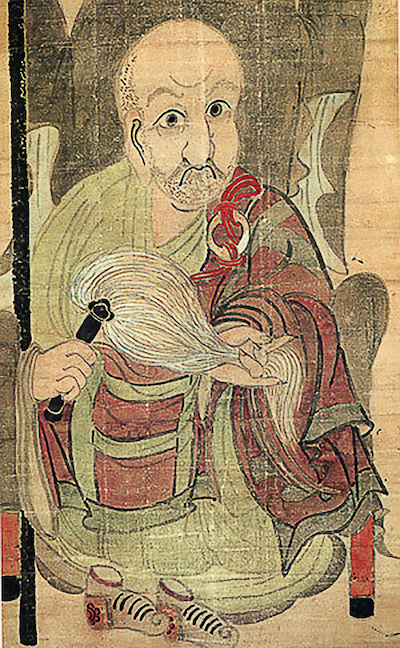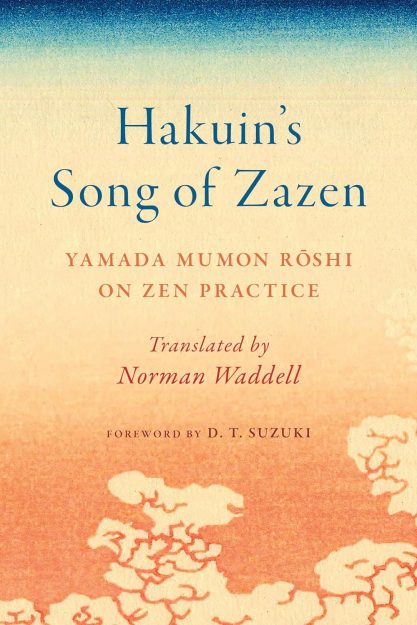All beings are from the first buddhas,
Their kinship is like water and ice:
Apart from water there is no ice,
Apart from beings, no buddhas.
–Hakuin Ekaku, Song of Zazen
The Chinese Zen master Ma-tsu Tao-i (709–788) was a dharma grandson of Hui-neng, the Sixth Patriarch. Ma-tsu was an imposing figure. He “walked with the slow, ponderous gait of an ox, his eyes had the glint of a glowering tiger.” He was a formidable priest from whose forge fully eighty-four Zen masters emerged.
One of Ma-tsu’s favorite teaching phrases was “This mind itself is Buddha.” Otherwise stated, this is Hakuin’s “All beings are from the first buddhas,” which has also been stated as “The mind of the unenlightened person is, as such, Buddha.” This saying is briefer and more trenchant than Bodhidharma’s “Pointing straight at the mind of man, seeing into the self-nature and attaining buddhahood.”
The phrase “This mind itself is Buddha” is an important one for the Zen school, though the first appearance of the phrase was not in a Zen work at all but in a sutra of the Pure Land school, the Sutra of Meditation on the Buddha of Immeasurable Life (Kanmuryoju-kyo). Commenting on the phrase in his Kyogyoshinsho (Teaching, Practice, Faith, and Realization) the Shin sect founder Shinran wrote,
“The mind itself is Buddha” means there is no Amida Buddha apart from the mind of faith. It is, for example, like fire taking hold in a piece of wood and being unable to leave the wood. Because it is unable to leave the wood, the fire continues burning it until the wood is finally consumed completely and becomes totally fire.
So even Shinran, a proponent of the Pure Land’s “other-power” teaching, acknowledges that Buddha does not exist apart from the mind. Shinran chooses to use the analogy of fire and wood instead of water and ice. Fire is produced on coming together with wood, and the fire that appears does not exist apart from wood. By virtue of its not existing apart from fire, wood goes on to become fire.
Living beings are not born from buddhas; buddhas are born from the minds of living beings. Buddhas thus born do not exist apart from living beings. Living beings by virtue of not existing apart from buddhas are assimilated into buddhahood and go on to become fully attained buddhas.
Hakuin Ekaku wrote in his Song of Zazen:
Apart from water there is no ice,
Apart from beings, no buddhas.
Ice not existing apart from water may seem to us a common everyday reality, but in other parts of the world there is a different reality. In the Arctic or Antarctica, ice is found everywhere you look, but there is no fresh water. If you want water, you have to melt some ice. It is not possible in today’s world of the latter-day dharma for human beings to worship Buddha. If living beings want to encounter Buddha, their only recourse is to discover Buddha within their own minds. There is no other way they can worship Buddha. Thus the saying, Apart from beings, no buddhas. Like wood producing fire and the fire being inseparable from the wood, when water is made from ice, the ice gradually melts and the volume of water increases, and the unmelted ice that still floats in the water in no way obstructs the water.
Living beings are not born from buddhas; buddhas are born from the minds of living beings.
This is what the Pure Land teaching means when it says that you attain liberation with your afflicting passions intact, that your sins or karmic hindrances do nothing to obstruct your liberation. Just like wood finally becoming fire and ice finally becoming water, when the time comes for the afflicting passions to become enlightenment and sin and evil to turn into acts of virtue, even if you yourself do nothing, it will happen of itself.
Among Shinran Shonin’s Koso Wasan (Hymns of High Priests) are these two verses:
Your karmic obstacles become a body of merit,
Existing in a relation like that of ice and water;
Where there’s much ice there’s also much water,
Where obstacles are many, virtues also abound.
It is taught that a person who takes delight
In shinjin is no different from the Tathagata;
A mind of great faith is the buddhanature,
The buddhanature is, in itself, the Tathagata.
The lines A mind of great faith is the buddhanature, / The buddhanature is, in itself, the Tathagata are taken verbatim from the Nirvana Sutra. The pure mind that affirms unconditionally the Tathagata’s wisdom and compassion must itself be the Tathagata.
A perfectly clear state of a mind firmly established in great faith is in no way different from the clarity of the buddhanature in someone who has cast aside all discrimination and achieved self-awakening. The buddhanature itself is Buddha. We learn of the Buddha’s boundless compassion, and when this ardent compassion melts the ice in our hearts, then for the first time “the mind that resolves to recite the Nembutsu arises in us,” opening up the realm of the mind of great faith (shinjin). Doing zazen and becoming one with heaven and earth, hearing “Kaa” when a crow cries and “Woof” when a dog barks, we awaken to the buddhanature in ourselves, in the realization that our mind never was a restricted, unfree lump of ice, and in that way we experience the joy of All beings are from the first buddhas and grasp the truth of Apart from beings, no buddhas.
◆
Adapted from Hakuin’s Song of Zazen: Yamada Mumon Roshi on Zen Practice by Yamada Mumon Roshi and translated by Norman Waddell. English translation © 2024 by Norman Waddell. Reprinted in arrangement with Shambhala Publications, Inc. Boulder, CO.
Thank you for subscribing to Tricycle! As a nonprofit, we depend on readers like you to keep Buddhist teachings and practices widely available.

